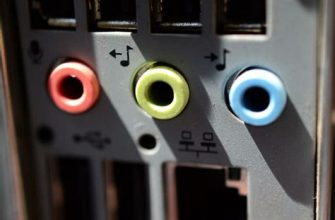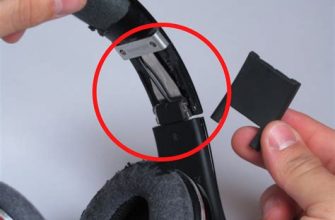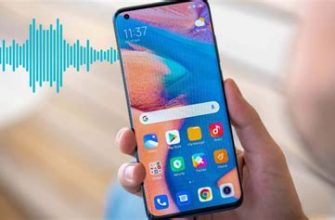Imagine the frustration of putting on your favorite pair of headphones, eagerly anticipating the crisp and clear sound that they usually deliver, only to find that the volume has drastically decreased. It can be incredibly disappointing and even hinder your enjoyment of music, movies, or podcasts. However, before you rush to replace your headphones or panic about a permanent loss in audio quality, there are a few simple troubleshooting steps you can take to potentially resolve the issue.
The first step is to assess the connections and cables. Sometimes, the problem lies in a faulty connection rather than the headphones themselves. Inspect the audio jack, ensuring it is fully inserted into the device you are using. If it appears loose or damaged, try using a different cable or adapter to eliminate the possibility of a faulty connection.
If the connection seems secure, the next step is to check your device's audio settings. It is possible that the volume may have been accidentally lowered or muted. Adjust the volume levels on both your device and any accompanying software, such as media players or streaming apps. Additionally, make sure that any audio enhancements or equalizer settings are properly adjusted for optimal sound output.
Another potential cause of decreased volume is a buildup of debris or wax in the headphones. Over time, earwax or other particles can accumulate in the earbuds or headphone speakers, blocking the sound and reducing volume levels. Take a moment to inspect the mesh or speaker openings and clean them gently using a soft, dry cloth or a small brush. Avoid using liquids or sharp objects, as they may damage the headphones.
In conclusion, experiencing a decrease in volume in your headphones can be frustrating, but it is not necessarily a cause for alarm. By checking the connections, adjusting your device's audio settings, and cleaning the headphones if necessary, you may be able to restore the volume to its former glory. Remember, troubleshooting steps may vary depending on the specific headphones and device you are using, so consult the manufacturer's instructions or support resources if needed.
Why Are My Headphones Losing Volume? 4 Possible Reasons
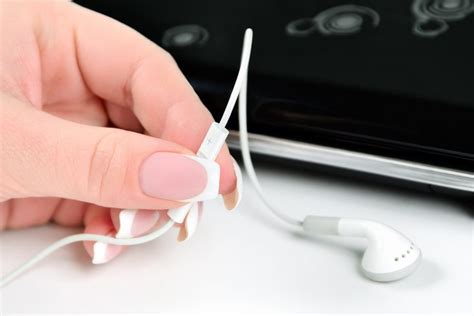
Discovering the root cause of diminishing sound quality can be a frustrating experience for headphone enthusiasts. When faced with the issue of headphones gradually becoming quieter, it is important to explore potential reasons behind this decline in audio performance. By understanding these underlying factors, you can effectively troubleshoot and resolve the problem, restoring your headphones to their optimum volume levels.
| Possible Reason | Explanation |
|---|---|
| 1. Cable Damage or Loose Connection | A common culprit behind diminishing headphone volume is cable damage or a loose connection. Over time, the wires within the headphone cable can fray or break, resulting in a loss of audio signal. Additionally, if the connection between the headphone jack and device is not secure, it can lead to a reduction in sound output. |
| 2. Dirty or Blocked Audio Jack | An obstructed or dirty audio jack can be another factor contributing to reduced volume levels. Dust, lint, or debris can accumulate inside the jack, preventing a proper connection between the headphones and the device. This blockage can result in weaker audio output and a quieter listening experience. |
| 3. Battery Depletion | If you are using wireless headphones, a diminishing battery can impact the sound quality and volume. As the battery power decreases, the headphone's ability to produce loud and clear audio may also diminish. Regularly checking and charging the battery can help maintain optimal volume levels. |
| 4. Audio Settings or Device Issues | Adjusting the audio settings on your device or encountering software problems can also affect headphone volume. It is possible that the audio output is set to a lower level or there may be a bug impacting the device's ability to deliver full volume. Exploring the settings and updating the device's firmware can help address these issues. |
By considering these potential reasons, you can begin troubleshooting and attempting solutions to rectify the declining volume levels of your headphones. Whether it's examining the cable, cleaning the audio jack, maintaining battery life, or addressing device settings, being proactive in identifying and resolving the issue will ensure an enjoyable listening experience with restored audio clarity and volume.
Cable or Jack Issues
One of the possible reasons why the sound from your headphones is becoming less audible could be related to issues with the cable or jack. The cable and jack serve as the main connection between your headphones and the audio source, allowing the transmission of audio signals. If there are problems with either the cable or the jack, it can result in reduced sound quality or a decrease in volume.
To determine if the cable or jack is causing the issue, you can start by checking the physical condition of the cable. Look for any visible signs of damage such as frayed wires, kinks, or cuts. These damages can disrupt the flow of audio signals, leading to a decrease in volume. Additionally, ensure that the cable is securely connected to both the headphones and the audio device.
If the cable appears to be in good condition, the next step is to examine the headphone jack. The jack is the metal or plastic connector that plugs into the audio device. Over time, the jack can accumulate dirt, debris, or lint, which can interfere with the audio signal. Gently inspect the jack and clean it using a soft cloth or compressed air if necessary. Be careful not to damage the internal components of the jack during the cleaning process.
| Issue | Possible Solution |
|---|---|
| Frayed cable | Replace the cable or consider repairing it |
| Loose connection | Ensure the cable is securely connected to both headphones and audio device |
| Dirty jack | Clean the headphone jack using a soft cloth or compressed air |
If the cable and jack appear to be in good condition, there may be other underlying factors causing the decrease in volume. In such cases, it is recommended to consult the manufacturer's guidelines or seek professional assistance to diagnose and resolve the issue.
By addressing cable or jack problems promptly, you can potentially restore the original sound quality and enjoy your headphones at their full potential once again.
Build-up of Earwax
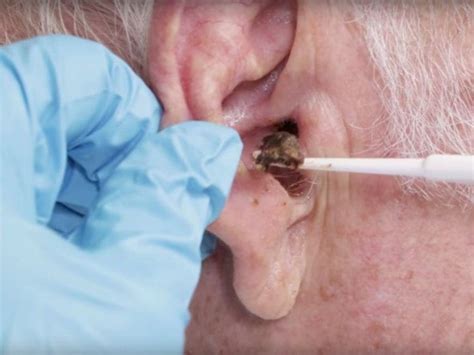
In this section, we will discuss a common problem that can cause a decrease in the volume of your headphones - the build-up of earwax. Although earwax is a natural substance produced by our bodies, an excessive accumulation of it can lead to various issues, including reduced audio quality when using headphones.
Earwax, also known as cerumen, is a waxy material that is secreted by glands in the ear canal. Its main function is to protect the ear by trapping dirt, dust, and other foreign particles, preventing them from reaching the delicate parts of the ear. However, the amount of earwax produced varies from person to person, and sometimes it can accumulate to the point where it causes problems.
When earwax builds up in the ear canal, it can create a barrier that affects the transmission of sound waves to the eardrum. This can result in a reduction in volume or muffled sound when using headphones. Additionally, the increased pressure caused by the build-up can also lead to discomfort or pain in the ears. Therefore, it is important to address this issue if you notice a decrease in headphone volume.
| Signs of Earwax Build-up |
|---|
|
To deal with the build-up of earwax and restore the volume of your headphones, there are several methods you can try. It is important to note that you should avoid using sharp objects, such as cotton swabs, to remove the earwax, as it can push the wax further into the ear canal and potentially damage the eardrum. Instead, consider the following gentle approaches:
1. Soften the Earwax: Using a few drops of mineral oil, baby oil, or over-the-counter ear drops, you can soften the earwax, making it easier to remove naturally.
2. Irrigation: Using a bulb syringe filled with warm water or saline solution, gently flush the ear canal to dislodge the earwax. It is important to tilt your head to the side to allow the water to flow out after irrigation.
3. Seek Medical Assistance: If the above methods do not provide relief or if you experience severe pain or persistent symptoms, it is advisable to consult a healthcare professional or an ear specialist who can safely remove the earwax using specialized tools.
By addressing the build-up of earwax, you can improve the sound quality of your headphones and prevent potential discomfort or other complications. Remember to regularly clean your ears and avoid inserting any objects into the ear canal to reduce the risk of excessive cerumen accumulation.
Adjusting the Volume Level
One of the common issues that users may encounter with their headphones is a decrease in volume. To address this problem, it is important to understand how to make adjustments to the volume level.
In order to rectify the situation and restore the desired audio experience, it is crucial to be familiar with different methods of adjusting the volume level. By employing various techniques, you can regain the optimal sound quality and ensure that your headphones are performing as expected.
There are several approaches that can be taken to address a decrease in volume. First, it is recommended to check the volume settings on the device that the headphones are connected to. This includes inspecting both the physical buttons on the device and the software settings. By increasing the volume level on the device, you may be able to overcome the decrease in volume experienced through the headphones.
An alternative method to adjust the volume level is to utilize the controls on the headphones themselves. Many headphones have integrated volume control buttons or sliders that enable users to modify the volume directly from the headphones. By experimenting with these controls, you can find the suitable volume level that meets your preferences.
In some cases, a decrease in volume may be caused by a buildup of dirt or debris in the headphone jack or connector. Cleaning these parts carefully and removing any obstructions can help restore the volume level to its normal state. Additionally, regularly maintaining and cleaning your headphones can prevent such issues from occurring in the first place.
By following these methods and utilizing the available volume adjustment options, you can effectively address the issue of decreasing volume in your headphones. It is important to note that if the problem persists, it may be necessary to seek professional assistance or consider replacing the headphones.
FAQ
Why are my headphones getting quieter?
There could be several reasons why your headphones are getting quieter. One possibility is that the volume settings on your device or media player have been adjusted. Make sure to check the volume levels and increase it if necessary. Another reason could be that there is debris or dirt in the headphone jack or on the headphone connectors. This can interfere with the audio signal and cause a decrease in volume. Try cleaning the headphone jack and connectors using a soft brush or cotton swab. Additionally, the headphone cable might be damaged, resulting in a decrease in sound quality. Inspect the cable for any visible signs of wear or damage, and consider replacing it if needed.
How can I fix my headphones if the sound is becoming quieter in one ear?
If you're experiencing a decrease in sound on one side of your headphones, the issue is likely due to a problem with the headphones themselves. Start by checking the balance settings on your device to ensure they are centered. If the problem persists, try connecting your headphones to a different device to see if the issue is with your original device. If the sound is still quieter in one ear, it is possible that the headphone driver or cable on that side is faulty. In this case, you may need to replace or repair your headphones to resolve the issue.
Can using headphones at high volumes cause the sound to become quieter?
No, using headphones at high volumes should not cause the sound to become quieter. However, listening to music or audio at excessively loud volumes for extended periods can lead to hearing damage. It is recommended to keep the volume at a moderate level to protect your hearing. If you find that the sound is getting quieter while using headphones at safe volume levels, it is likely due to other factors such as dirty connectors, damaged cables, or issues with your device's settings.

